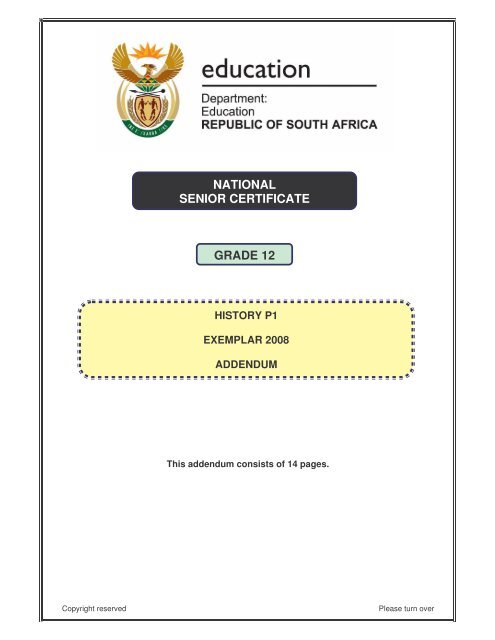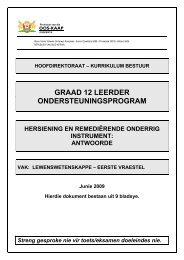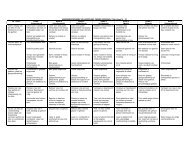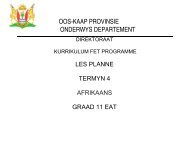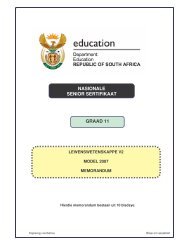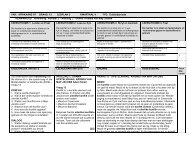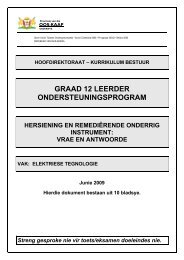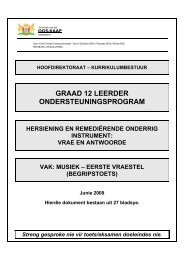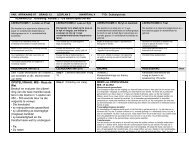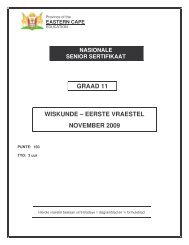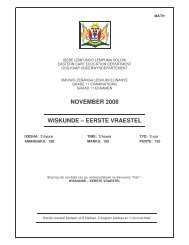NATIONAL SENIOR CERTIFICATE GRADE 12 - Curriculum
NATIONAL SENIOR CERTIFICATE GRADE 12 - Curriculum
NATIONAL SENIOR CERTIFICATE GRADE 12 - Curriculum
You also want an ePaper? Increase the reach of your titles
YUMPU automatically turns print PDFs into web optimized ePapers that Google loves.
<strong>NATIONAL</strong><strong>SENIOR</strong> <strong>CERTIFICATE</strong><strong>GRADE</strong> <strong>12</strong>HISTORY P1EXEMPLAR 2008ADDENDUMThis addendum consists of 14 pages.Copyright reservedPlease turn over
History/P1 2 DoE/Exemplar 2008NSCADDENDUMQUESTION 1: WHY DID BERLIN BECOME THE FOCAL POINT OF THEIDEOLOGICAL CLASH IN THE COLD WAR BETWEEN THESOVIET UNION (USSR) AND THE UNITED STATES OF AMERICA(USA)?SOURCE 1AThis is an extract from The Cold War by David Taylor commenting on life in Berlin and theconstruction of the Berlin Wall.THE BERLIN WALL GOES UPWest Berlin received large amounts of money under the Marshall Plan. This part of thecity was rebuilt and soon began to prosper. There was plenty of food in the shops, andthere were cinemas, theatres, cafes and nightclubs. West Berliners could enjoy lifeagain. Above all, they were able to vote in free elections and speak their minds withoutfear of arrest.East Berlin, under communist rule, was a dour (harsh) place. Many buildings remainedderelict and there was very little to buy in the shops. Most people lived in dull apartmentblocks and few owned cars, refrigerators or washing machines, which were becomingcommon in Western Europe and the USA. East Berliners did not enjoy freedom ofspeech and lived in fear of being arrested by the secret police. But, despite thesedifferences, people could still travel wherever they liked in the city. Underground trainsand trams ran between the East and West. East Berliners were free to visit friends in theWest, and over 50 000 of them travelled to work there each day.Many East Germans wanted a better standard of living and defected to West Berlin.Most of the defectors were under the age of 45 and many had useful skills. Defectorsincluded teachers, lawyers, doctors and engineers. There were more job opportunities inthe West and wages were higher. Soon more than 200 000 people a year weredefecting to the West. East Germany was losing most of its skilled workers.Khrushchev, the Soviet leader, and JF Kennedy, the new president of the USA, met inVienna in June 1961. Kennedy was determined to hang on to West Berlin. Khrushchev,somehow, had to stop the flood of people defecting. Khrushchev decided to build a wallthat would seal East Berlin off from the West. In the earlier hours of 13 August 1961,East German workmen started to erect a barbed-wire fence between East and WestBerlin.Copyright reservedPlease turn over
History/P1 3 DoE/Exemplar 2008NSCADDENDUMSOURCE 1BThis is an adapted extract from President JF Kennedy's speech on 26 June 1961.Kenndy was speaking in the Rudolf Wilde Platz, near the Berlin Wall.There are many people in the world who really don't understand, or say they don't, what isthe great issue between the free world and the communist world. Let them come toBerlin.Freedom has many difficulties and democracy is not perfect, but we have never had toput up a wall to keep our people in, to prevent them from leaving us. I want to say, onbehalf of my countrymen, who live many miles away on the other side of the Atlantic, whoare far distant from you, that they take the greatest pride that they have been able toshare with you, even from a distance, the story of the last 18 years. I know of no town, nocity, that has been besieged for 18 years that still lives with the vitality, and the force, andthe hope and the determination of the city of West Berlin. While the wall is the mostobvious and vivid demonstration of the failures of the communist system, for all the worldto see, we take no satisfaction in it, for it is, as your mayor has said, an offence not onlyagainst history but an offence against humanity, separating families, dividing husbandsand wives and brothers and sisters, and dividing a people who wish to be joined together.All free men, wherever they may live, are citizens of Berlin, and therefore, as a free man, Itake pride in the words 'Ich bin ein Berliner'. ('I am a Berliner.')Copyright reservedPlease turn over
History/P1 4 DoE/Exemplar 2008NSCADDENDUMSOURCE 1CThe following are photographs of the Berlin Wall.PHOTOGRAPH 1: Shows the Berlin Wall with the famous Brandenburg Gate in thebackground. The board says: 'Attention, you are now leaving WestBerlin'.Copyright reservedPlease turn over
History/P1 5 DoE/Exemplar 2008NSCADDENDUMPHOTOGRAPH 2: Shows West Berliners looking over the Berlin Wall soon after it wasbuilt in 1961.Copyright reservedPlease turn over
History/P1 6 DoE/Exemplar 2008NSCADDENDUMQUESTION 2: WHAT WERE THE FACTORS THAT LED TO THEDECOLONISATION PROCESS IN AFRICA IN THE 1960s ANDTHE 1970s?SOURCE 2AThe extract below relates to the discussion on the decolonisation of Africa.Nkrumah: 'No more white domination! We want Africa for the Africans.'General de Gaulle: 'We lost thousands of French soldiers in the war in Algeria.'Chamberlain: 'Egypt nationalised the Suez Canal for itself – what cheek.'King Leopold II: 'The United Nations Organisation disapproves of what we're doing in theCongo … we have to hurry up and get out of Africa before anything elsegoes wrong.'General de Gaulle: 'Gentleman, let's see how fast we can get out of Africa.'French colonial officer: 'But Sir, the people aren't trained to manage their owngovernment.'French administrator: 'They'll just have to manage. We cannot spend money on thesecolonies.'African community: 'We are poor and suffering. But at least we are beginning to governourselves and build new institutions.'SOURCE 2BThis is an extract from a speech by British Prime Minister, Harold Macmillan, to the SouthAfrican Parliament, February 1960. The extract is taken from Causes and Consequencesof Independence in Africa.The most striking of all the impressions I have formed since I left London a month ago is ofthe strength of … African national consciousness. In different places it may take differentforms. But it is happening everywhere. The wind of change is blowing through thiscontinent.Copyright reservedPlease turn over
History/P1 7 DoE/Exemplar 2008NSCADDENDUMSOURCE 2CThis is an extract taken from Africa Since Independence with reference to Nkrumah'saddress.When Kwame Nkrumah uttered the immortal words, 'Seek ye first the political kingdomand all else will be added unto you,' he was articulating a widely held belief that self-rulewould make a profound difference. For Nkrumah and like-minded nationalists, the colonialstate had functioned in the service of European interests. Once commandeered byAfricans, however, the state would deliver collective benefits and greater materialprosperity for all.SOURCE 2DThis is an extract from General History of Africa. It defines African nationalism.In Africa, most of the colonies that had been created were made up of several culturallyand historically different groups which did not share a common history. Their main basisfor unity was that they were subjected to a common alien (foreign) ruler.The expression of nationalism in Africa then was a desire of these different communities toforge new identities that would help them in their struggle against the atrocities andshortcomings of the colonial administrations.Copyright reservedPlease turn over


